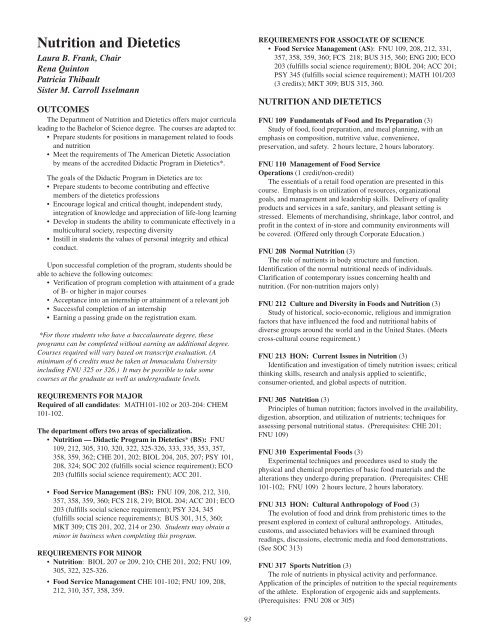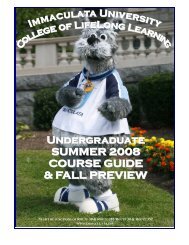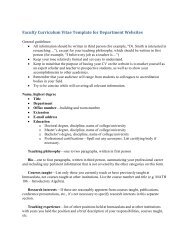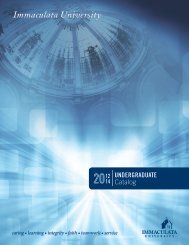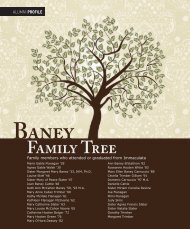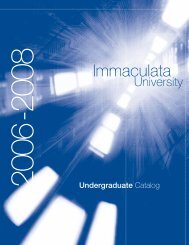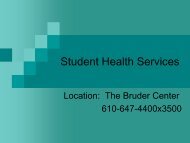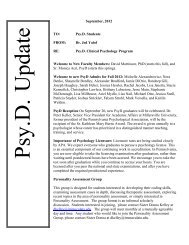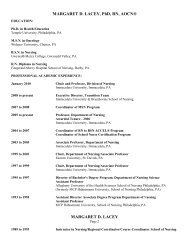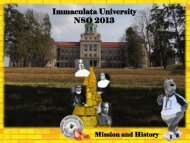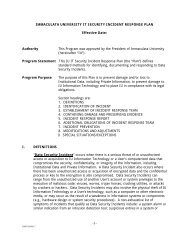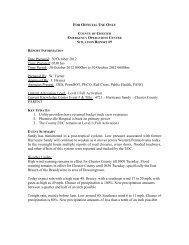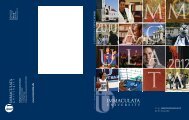Undergraduate Catalog 2008-2010 - Immaculata University
Undergraduate Catalog 2008-2010 - Immaculata University
Undergraduate Catalog 2008-2010 - Immaculata University
You also want an ePaper? Increase the reach of your titles
YUMPU automatically turns print PDFs into web optimized ePapers that Google loves.
Nutrition and Dietetics<br />
Laura B. Frank, Chair<br />
Rena Quinton<br />
Patricia Thibault<br />
Sister M. Carroll Isselmann<br />
OUTCOMES<br />
The Department of Nutrition and Dietetics offers major curricula<br />
leading to the Bachelor of Science degree. The courses are adapted to:<br />
• Prepare students for positions in management related to foods<br />
and nutrition<br />
• Meet the requirements of The American Dietetic Association<br />
by means of the accredited Didactic Program in Dietetics*.<br />
The goals of the Didactic Program in Dietetics are to:<br />
• Prepare students to become contributing and effective<br />
members of the dietetics professions<br />
• Encourage logical and critical thought, independent study,<br />
integration of knowledge and appreciation of life-long learning<br />
• Develop in students the ability to communicate effectively in a<br />
multicultural society, respecting diversity<br />
• Instill in students the values of personal integrity and ethical<br />
conduct.<br />
Upon successful completion of the program, students should be<br />
able to achieve the following outcomes:<br />
• Verification of program completion with attainment of a grade<br />
of B- or higher in major courses<br />
• Acceptance into an internship or attainment of a relevant job<br />
• Successful completion of an internship<br />
• Earning a passing grade on the registration exam.<br />
*For those students who have a baccalaureate degree, these<br />
programs can be completed without earning an additional degree.<br />
Courses required will vary based on transcript evaluation. (A<br />
minimum of 6 credits must be taken at <strong>Immaculata</strong> <strong>University</strong><br />
including FNU 325 or 326.) It may be possible to take some<br />
courses at the graduate as well as undergraduate levels.<br />
REQUIREMENTS FOR MAJOR<br />
Required of all candidates: MATH101-102 or 203-204: CHEM<br />
101-102.<br />
The department offers two areas of specialization.<br />
• Nutrition — Didactic Program in Dietetics* (BS): FNU<br />
109, 212, 305, 310, 320, 322, 325-326, 333, 335, 353, 357,<br />
358, 359, 362; CHE 201, 202; BIOL 204, 205, 207; PSY 101,<br />
208, 324; SOC 202 (fulfills social science requirement); ECO<br />
203 (fulfills social science requirement); ACC 201.<br />
• Food Service Management (BS): FNU 109, 208, 212, 310,<br />
357, 358, 359, 360; FCS 218, 219; BIOL 204; ACC 201; ECO<br />
203 (fulfills social science requirement); PSY 324, 345<br />
(fulfills social science requirements); BUS 301, 315, 360;<br />
MKT 309; CIS 201, 202, 214 or 230. Students may obtain a<br />
minor in business when completing this program.<br />
REQUIREMENTS FOR MINOR<br />
• Nutrition: BIOL 207 or 209, 210; CHE 201, 202; FNU 109,<br />
305, 322, 325-326.<br />
• Food Service Management CHE 101-102; FNU 109, 208,<br />
212, 310, 357, 358, 359.<br />
REQUIREMENTS FOR ASSOCIATE OF SCIENCE<br />
• Food Service Management (AS): FNU 109, 208, 212, 331,<br />
357, 358, 359, 360; FCS 218; BUS 315, 360; ENG 200; ECO<br />
203 (fulfills social science requirement); BIOL 204; ACC 201;<br />
PSY 345 (fulfills social science requirement); MATH 101/203<br />
(3 credits); MKT 309; BUS 315, 360.<br />
NUTRITION AND DIETETICS<br />
FNU 109 Fundamentals of Food and Its Preparation (3)<br />
Study of food, food preparation, and meal planning, with an<br />
emphasis on composition, nutritive value, convenience,<br />
preservation, and safety. 2 hours lecture, 2 hours laboratory.<br />
FNU 110 Management of Food Service<br />
Operations (1 credit/non-credit)<br />
The essentials of a retail food operation are presented in this<br />
course. Emphasis is on utilization of resources, organizational<br />
goals, and management and leadership skills. Delivery of quality<br />
products and services in a safe, sanitary, and pleasant setting is<br />
stressed. Elements of merchandising, shrinkage, labor control, and<br />
profit in the context of in-store and community environments will<br />
be covered. (Offered only through Corporate Education.)<br />
FNU 208 Normal Nutrition (3)<br />
The role of nutrients in body structure and function.<br />
Identification of the normal nutritional needs of individuals.<br />
Clarification of contemporary issues concerning health and<br />
nutrition. (For non-nutrition majors only)<br />
FNU 212 Culture and Diversity in Foods and Nutrition (3)<br />
Study of historical, socio-economic, religious and immigration<br />
factors that have influenced the food and nutritional habits of<br />
diverse groups around the world and in the United States. (Meets<br />
cross-cultural course requirement.)<br />
FNU 213 HON: Current Issues in Nutrition (3)<br />
Identification and investigation of timely nutrition issues; critical<br />
thinking skills, research and analysis applied to scientific,<br />
consumer-oriented, and global aspects of nutrition.<br />
FNU 305 Nutrition (3)<br />
Principles of human nutrition; factors involved in the availability,<br />
digestion, absorption, and utilization of nutrients; techniques for<br />
assessing personal nutritional status. (Prerequisites: CHE 201;<br />
FNU 109)<br />
FNU 310 Experimental Foods (3)<br />
Experimental techniques and procedures used to study the<br />
physical and chemical properties of basic food materials and the<br />
alterations they undergo during preparation. (Prerequisites: CHE<br />
101-102; FNU 109) 2 hours lecture, 2 hours laboratory.<br />
FNU 313 HON: Cultural Anthropology of Food (3)<br />
The evolution of food and drink from prehistoric times to the<br />
present explored in context of cultural anthropology. Attitudes,<br />
customs, and associated behaviors will be examined through<br />
readings, discussions, electronic media and food demonstrations.<br />
(See SOC 313)<br />
FNU 317 Sports Nutrition (3)<br />
The role of nutrients in physical activity and performance.<br />
Application of the principles of nutrition to the special requirements<br />
of the athlete. Exploration of ergogenic aids and supplements.<br />
(Prerequisites: FNU 208 or 305)<br />
93


